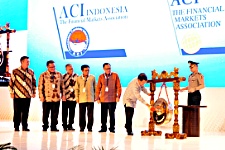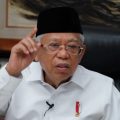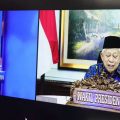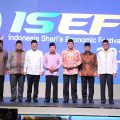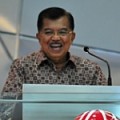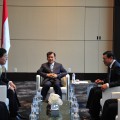Jakarta-wapresri.go.id. To face the ASEAN Economic Community (AEC) as well as to boost economic growth, efficiency becomes a key factor.
“Indonesia puts emphasis on the realization of efficient financial system in order to succeed in the competition,” said Vice President Jusuf Kalla when opening the 55thACI-Financial Markets Association World Congress 2016 at the Ritz Carlton Hotel Pacific Place, Jakarta, on Friday, (April, 29).
According to the Vice President, one of the reasons why financial markets other than banks find it hard to compete in Indonesia is that deposit interest rate in Indonesia is still very high. Yet in fact, he added, many countries such as Japan have implemented negative interest.
Therefore, Mr. Kalla continued, Indonesian government through the Financial Services Authority (OJK) and Bank Indonesia (BI) take the middle path by lowering the interest rate at a competitive level to that of other ASEAN countries. This, he said, is expected would speed up economic growth.
The Vice President believed that it is impossible for a country, moreover a country of emerging markets like Indonesia that is vulnerable to crisis, to have economic growth without a good financial system and prudence.
The Vice President then recounted series of crises in Indonesia. In 1997-1998, he said, the country experienced the biggest crisis ever with a negative growth of 15% and inflation reaching 60% to 70%. Apart from crisis that hit Asia at the time, the crisis is due to lack of prudence in managing financial system.
Ten years earlier, told Mr. Kalla, to be exact in 1988, the Indonesian financial system was very liberal.
“It was so easy to establish a bank in Indonesia. Within a few months, 290 new banks opened in the country. Unfair competition within limited economy had caused problems in the banking system 10 years later, and there came the crisis,” told the Vice President.
In 2008, he continued, Indonesia was also affected when the global crisis happened, that is when the US investment firm Lehman Brothers filed for bankruptcy.
“These experiences should be a lesson,” he affirmed.
Almost all countries, Mr. Kalla said, are currently still experiencing economic slowdown.
However, he conveyed that during the period Indonesia is in the middle position with growth of 5 percent, which is not too low but not extraordinary. This, he argued, is due to the country’s abundant natural and human resources as well as potential market and production place at the same time.
“What matters most for Indonesia is stability so that the economy could grow well,” he said.
On the financial side, the Vice President expected the country would not get caught up in too high deficit, which is not more than 3% of gross domestic product (GDP).
To promote economic growth, he said, in addition to infrastructure development, government would also improve current national financial system with inclusive finance as the main program.
“Since the IT system has been better than ever, the implementation of inclusive finance is hoped could reach 90 percent,” he said.
Earlier, OJK chairman Muliaman Hadad conveyed, as a member of G20, Indonesia is committed to align with a wide range of rules agreed by G20 member states. This year, he added, Indonesia will be reviewed by G20 members in terms of consistency of application of the agreed rules and will also be assessed in the financial sector.
“We will surely seek ways to ensure that Indonesia is not too far from the implementation of standard business practices applied internationally,” said Hadad.
Meanwhile, BI governor Agus Martowardoyo said there are three sources of global risk in the future which need to be anticipated, namely divergence in the U.S. monetary policy compared to that of Europe and Japan, continued falling commodity prices, and slowing economic growth, particularly in higher private debt in countries of emerging markets.
However, Agus believed Indonesia would experience economic growth of 6% if it could answer the three fundamental challenges.
“First, to strengthen food security and energy, secondly, to strengthen the reliability of national industrial competitiveness, and third to strengthen the role of the financial sector as the basis for economic financing,” he explained.
The 55th ACI-Financial Markets Association this year takes the theme of “Unity in Diversity” which is adopted from Indonesia’s motto “Bhinneka Tunggal Ika” (Unity in Diversity). The event was attended by 800 local participants and 250 international participants.

